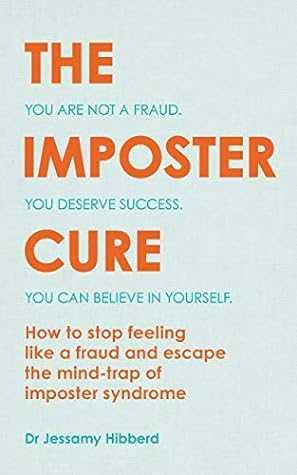Your one stop book summary, audiobook and book review spot for:
The Imposter Cure Summary
About The Imposter Cure Book
A solution-based self-help book that explores the psychological impact of imposter syndrome.
Imposter syndrome is a phenomenon in which people believe they are not worthy of success. They convince themselves that they have done well due to luck and are terrified their shortcomings will eventually be exposed, making it impossible to enjoy their accomplishments.
You've Got This explores the psychological impact of imposter syndrome and exposes the secrets fears and insecurities felt by millions of men and women. Dr Jessamy Hibberd provides sound expert advice to help the reader better understand theproblem and overcome it, so they think differently, gain self belief and learn to see themselves as others do.
Filled with case studies to bring the concepts alive and packed with strategies to increase confidence, this book is a must-read for anyone who has struggled with their achievements.
See More
4.8/5 (3067 reviews)
Audio and text
Download free PDF
The Imposter Phenomenon
- Imposter syndrome was first described by two clinical psychologists in 1978.
- They coined the term ‘imposter phenomenon’, a condition in which people believe they are not worthy of success and have a persistent belief in their lack of intelligence, skills, or competence.
- Imposter syndrome involves much more than just feeling fraudulent and it presents itself in a long list of different ways. It may appear as insecurity, self-doubt, fear of failure, and perfectionism. Or as self-criticism, low self-esteem, an inability to accept compliments.
3.07K
What Triggers The Imposter Syndrome
- Imposter syndrome can be triggered by any achievement or approval-related task or as a result of feeling insecure about your knowledge or skills, particularly when you work in a competitive atmosphere and when responsibilities increase.
- It tends to be more intense during times of transition or change, or when you are faced with new challenges (a new job, project, or being accepted into higher education). This pushes you out of your comfort zone into new routines and puts you under increased scrutiny.
- The syndrome can also occur when you feel different from the core group you are part of.
2.83K
Setting Unrealistic High Standards
Imposter syndrome normally occurs when there is a tension between two views: the standards you set yourself and how you assess yourself as doing.
The high standards you set yourself are a large part of the problem, as is the negative internal voice you use to motivate yourself. You expect that you need to be the best and do everything flawlessly in your career, relationships, and personal life.
2.91K
Fenomen varalice
- Sindrom varalice prvi su opisali dva klinička psihologa 1978.
- Oni su skovali izraz 'fenomen varalice', stanje u kojem ljudi vjeruju da nisu vrijedni uspjeha i uporno vjeruju u svoj nedostatak inteligencije, vještina ili kompetencija.
- Sindrom varalice uključuje mnogo više od samog osjećaja prevare i predstavlja se na dugoj listi različitih načina. Može se pojaviti kao nesigurnost, sumnja u sebe, strah od neuspjeha i perfekcionizam. Ili kao samokritičnost, nisko samopoštovanje, nemogućnost prihvatanja komplimenata.
1
Šta izaziva sindrom varalice
- Sindrom varalice može biti izazvan bilo kojim zadatkom koji se odnosi na postignuće ili odobravanje ili kao rezultat osjećaja nesigurnosti u vezi sa svojim znanjem ili vještinama, posebno kada se radi u takmičarskoj atmosferi i kada se odgovornosti povećavaju.
- Ima tendenciju da bude intenzivniji u vremenima tranzicije ili promjene, ili kada se suočeno sa novim izazovima (novi posao, projekat ili prijem u visoko obrazovanje). Ovo gura iz zone udobnosti u nove rutine i stavlja pod pojačan nadzor.
- Sindrom se također može pojaviti kada se osjeća drugačije od osnovne grupe kojoj se pripada.
1
Vrste kompetencija
Ovo su interna pravila koja se ljudi sa sindromom varalice uglavnom pridržavaju:
- Perfekcionisti postavljaju previsoke standarde za sebe i vjeruju da bi uvijek trebali pružiti savršenu izvedbu.
- Prirodni genijalci nastoje savladati svaku novu vještinu brzo i uz malo truda.
- Solista defini[e kompetenciju kao sposoban da uradi nešto sam i vjeruje da se uspjeh računa samo ako je bez pomoći.
- Stručnjak treba znati sve i vjeruje da prava kompetentnost znači znati apsolutno sve.
- Superžena/Supermuškarac mjeri kompetentnost na osnovu koliko je uloga u kojima se mogu istaći.
1
Supercharge your mind with one idea per day
Enter your email and spend 1 minute every day to learn something new.
I agree to receive email updates
